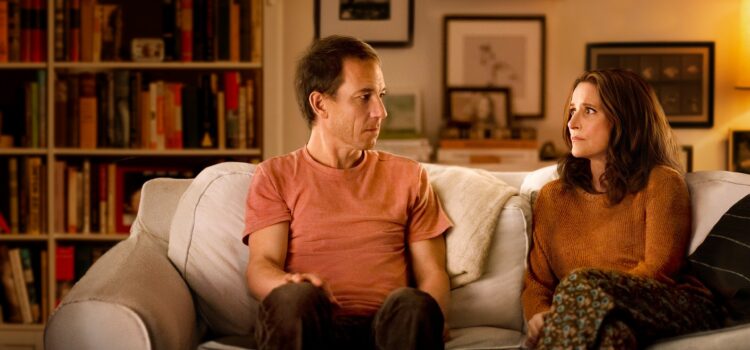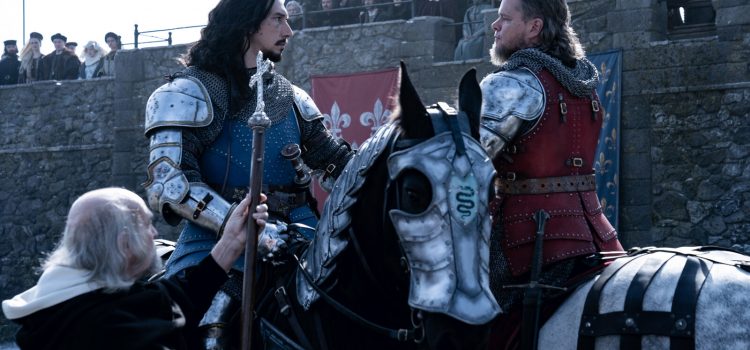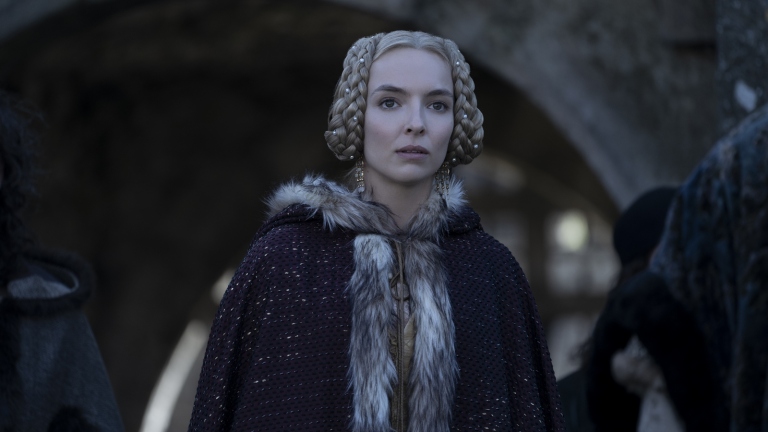By Alex McPherson
Breezy, funny, and insubstantial, director Nicole Holofcener’s “You Hurt My Feelings” provides its ensemble ample room to flex their comedic chops, but remains emotionally limited by a low-stakes narrative aiming for profundity and arriving at something less than revelatory.
Set within our dying planet in the bustling metropolis hellscape of New York City, “You Hurt My Feelings” revolves around Beth (Julia Louis-Dreyfus), a middle-aged author and teacher at The New School, who, all things considered, lives a pretty-damn-privileged existence. She has a new novel coming out — two years in the making — that she’s having trouble getting off the ground due to an unenthusiastic agent. It’s the follow-up to her moderately successful memoir that spotlighted her father’s verbal abuse, which instilled a huge layer of insecurity.
She’s sarcastic and judgy, but enjoys a happy marriage with her husband, Don (Tobias Menzies), a somewhat burnt-out therapist whose clients — played by real-life spouses Amber Tamblyn and David Cross, plus Zach Cherry in peak straight-faced hilarity — are becoming increasingly fed up with his lack of engagement and “results.”
Their 20-something son Eliot (Owen Teague) is an aspiring playwright working at a weed dispensary, frequently annoyed that he feels like a third wheel around his parents. Beth’s sister, Sarah (Michaela Watkins), is a jaded interior designer with a sardonic wit. Her brother-in-law, Mark (Arian Moayed), is an actor with dreams of fame and fortune struggling to secure roles beyond a small part in a “pumpkin movie.”
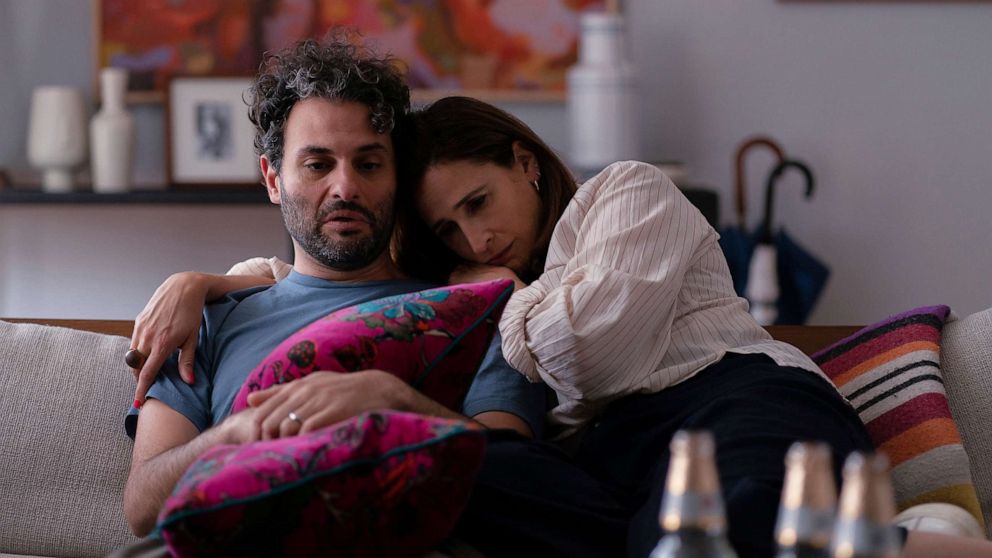
Suffice to say, everyone in this little circle is self-doubting, seeking validation and reassurance from those close to them. Our heroine, Beth, is particularly vulnerable. When she and Sarah overhear Don disclosing to Mark that he doesn’t like her newest novel and can’t stand reading draft after draft of it, Beth spirals — putting her marriage at risk as she grapples with this bombshell revelation.
Over the course of a 93-minute runtime, Beth gains greater understanding of how the “little white lies” we tell each other aren’t always that bad, along with how (shocker) we shouldn’t let our work or other’s reactions to our work define us and our well-being.
With Louis-Dreyfus inhabiting her character with an anxious, believable energy, “You Hurt My Feelings” remains an appealing watch, as Beth and company navigate rocky waters of communication and come to realizations that gently inform their existences going forward. This reflects life, in a sense, as some people change and some don’t, but the film still lacks heft. By the end, it takes a surprisingly light touch to its flawed characters, saying little of significance in the process.
That’s not to say the experience of watching “You Hurt My Feelings” isn’t enjoyable, though. Holofcener’s dialogue crackles with snarky wit, as Beth bumbles her way around NYC – casually critiquing plenty of people along the way, sometimes in offensive fashion. Beth herself, whether she realizes it or not, strategically deploys truths and little white lies in her day-to-day life — whether it’s half-heartedly volunteering at a church clothing giveaway to feel like a “good person,” to feigning interest in her students’ off-putting story ideas.
Louis-Dreyfus sells Beth’s outwardly bubbly nature and conceitedness, friendliness belying a lack of self love and belief in her own abilities as a creative. Her mother, Georgia (the always excellent Jeannie Berlin), perpetuates Beth’s anxieties through humorous passive-aggressiveness.
Beth trusts Don more than anyone else, however, so his seeming “betrayal” hits her like a wrecking ball, which Louis Dreyfus neither undersells nor overplays; if anything, the film would have benefited from a more cartoonish expression of her panic. As it stands, it’s difficult to connect with her concerns: they’re monumental to her, but as outside observers, they seem trivial, and Holofcener never dives deeply into her background or creative drive to establish real pathos for her plight.
She loves Don and Don loves her. Of course Don wants to be a supportive husband, of course he wouldn’t tell her his true feelings about her writing (which we’re never led as viewers to believe is actually praiseworthy), as he recognizes that his opinions are ultimately irrelevant: he’ll support her no matter what. This is evident from the outset, and, with some late-movie platitudes lacking nuance delivered by Teague (doing the most with a clichéd character), renders the core conflict of “You Hurt My Feelings” fairly shallow and predictable.
Aside from Beth’s unwarranted stressors, “You Hurt My Feelings” explores other facets of this idea, as people in her social bubble navigate similar waters of honesty and dishonesty, truth and lies, in their personal and professional bonds. Don, stressed about aging and exhausted from a string of demanding clients while putting on a brave face (which Menzies embodies with subtly-calibrated mannerisms), avoids admitting to his cataclysmic falsehood. This doesn’t pan out well, but guess what? Communication is key, as usual.
Sarah encounters her own challenges — her whole job involves appeasing finicky clients with artwork to adorn their homes, smiling and gritting her teeth, with plenty of unused insults at the ready under her breath. Mark struggles to find meaning and work as an actor, while Sarah stands behind him through thick and thin, notwithstanding she doesn’t think he’s all that good all the time.
Boosted by Holofcener’s zinger-filled screenplay and patient editing that zeroes in on expressions and awkward pauses, “You Hurt My Feelings” depicts these situations with a crowd-pleasing touch, but that doesn’t excuse that they aren’t all that compelling to watch in the first place. Indeed, the film’s muted style and inherent softness misses opportunities to critique its characters on a more foundational level, not fully selling their problems nor Beth’s gradual gaining of self-awareness. It’s not all that dramatic, or relatable, as we (im)patiently wait for the characters to catch up with reality.
Perhaps I’m the wrong demographic for this story, and perhaps the film’s lack of spectacle is the point, but it remains slight, less a meaningful story than a batch of gently amusing scenarios in service of relatable yet obvious messaging.
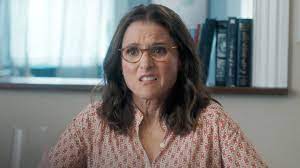
“You Hurt My Feelings” is a 2023 comedy-drama written and directed by Nicole Holofcener and starring Julia Louis-Dreyfus, Tobias Menzies, Owen Teague, Michaela Watkins, Arian Moayed, David Cross, Amber Tamblyn, Zach Cherry and Jeannie Berlin. It is rated R for language and runtime is 1 hour and 33 minutes. It opened in theaters May 26. Alex’s Grade: B-.
Alex McPherson is an unabashed pop culture nerd and a member of the St. Louis Film Critics Association.

